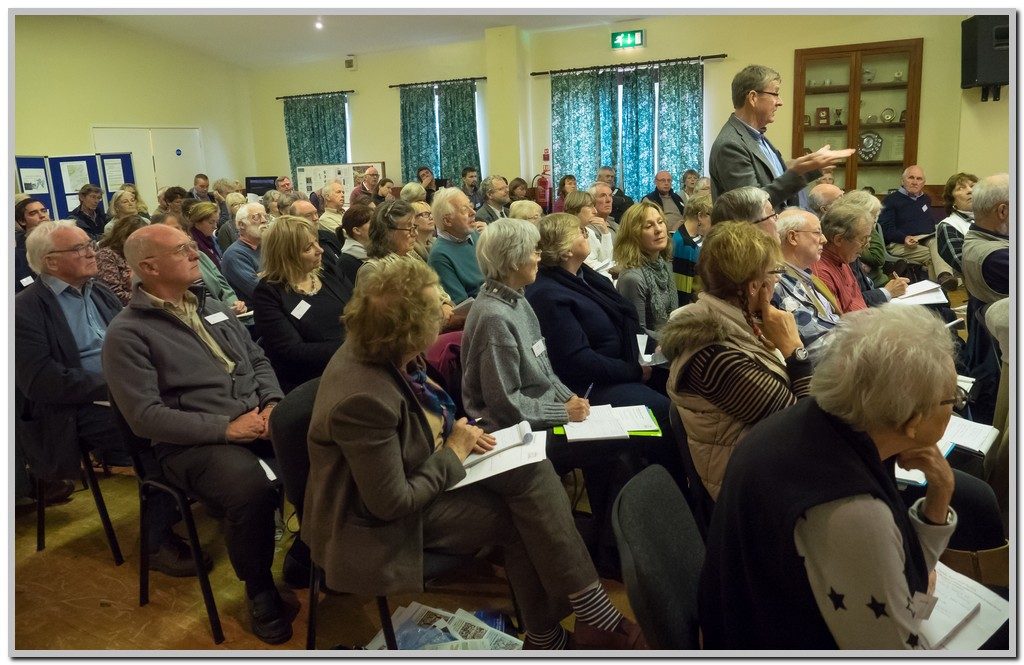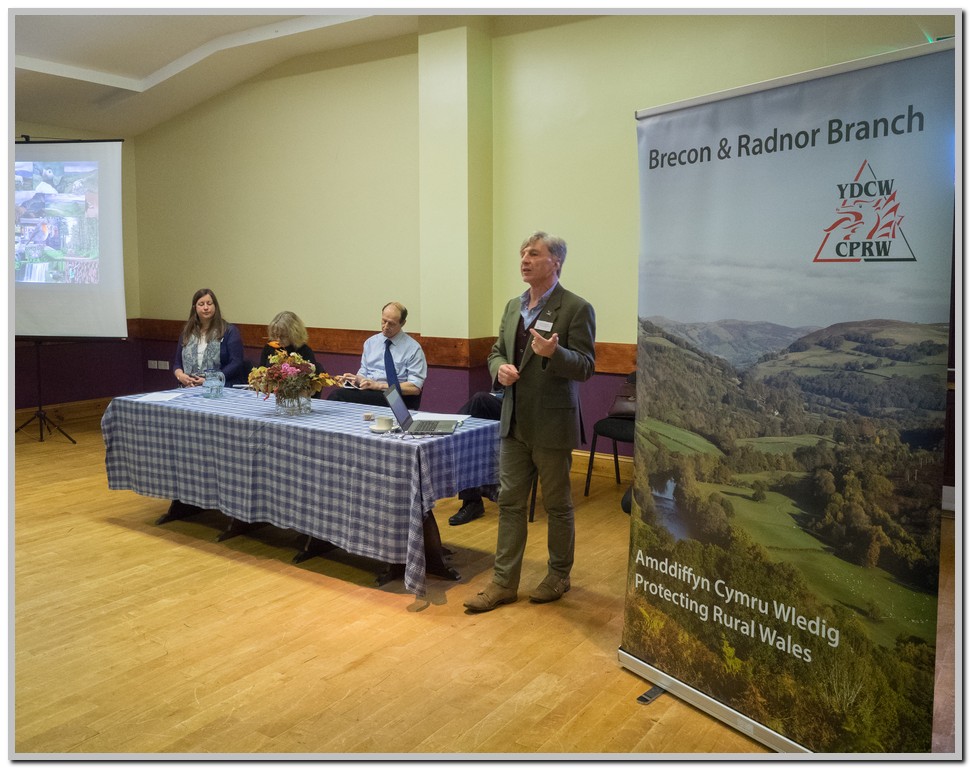Ponds, Rivers and Poultry Seminar – Report
CPRW Brecon & Radnor Branch seminar ‘Ponds, Rivers and Poultry’, Saturday 29 October 2016, Llanigon near Hay on Wye
The Brecon & Radnor CPRW branch committee were delighted to welcome 100 or so delegates to this important event, including representatives of CPRE in Herefordshire, the Woodland Trust, Cargill Meats Europe, and Herefordshire Council, Powys Ramblers and other local organisations, as well as concerned members of the public. It is regretted, and was remarked upon, that no Officer or County Councillor from Powys Council was present.

Julian Jones (Director, Radnorshire Wildlife Trust) spoke about the risks to conservation sites, including Radnorshire Wildlife Trust nature reserves, of land management generally and intensive poultry units in particular, and the further risks arising from the concentration of intensive poultry sheds in this area. He drew delegates’ attention to the recent State of Nature Wales report and the reported risk that 1 in 14 species is facing possible extinction in Wales. Concluding that we must not be complacent about species losses, and that we must adopt a cautious approach to the siting of environmentally challenging developments, he called on planners and regulators to ensure that those making the decisions on intensive poultry applications fully understand the environmental issues concerned.
Kate Adams (Head of Land Use, Wye and Usk Foundation) introduced the work of the Wye and Usk Foundation and the on-farm site management and mitigation advice which the trust provides to farmers. She outlined the severity of the phosphate pollution issues in local waters, graphically illustrated by a map from Herefordshire Nutrient Management Plan, and the very serious impacts this has on future development in Herefordshire. Kate also outlined the role that planners can and should play in minimising environmental damage through appropriate site selection, including use of scimap mapping to avoid high risk and identify low risk areas for poultry sheds and ranges. She stressed the urgent need for planners to properly understand the potential for serious pollution of these developments. Kate also made the point that the standard of applications is extremely poor and agents do not properly address local issues.
Christine Hugh-Jones (Secretary, CPRW Brecon & Radnor) explained the reasons for which CPRW Brecon & Radnor branch have become increasingly concerned about the proliferation of intensive poultry sheds and the current unsatisfactory planning treatment of these applications. She demonstrated the mapping tool which the branch has developed from Powys’s planning portal data and which is published on the branch website. The tool shows the cumulative picture of intensive poultry sheds in the local area and for each new application allows identification of neighbouring sites. Designated conservation sites are also mapped. Christine also demonstrated the spreadsheet summaries of applications which the branch prepares and makes available to the interested public.
Richard Ninnes (Head of Ecosystems Planning and Partnerships, North and Mid Wales, Natural Resources Wales) set out the objectives of the Water Framework Directive and NRW’s role as competent authority responsible for the achievement of these objectives. All local waters are required to achieve good overall status (in both chemical and ecological tests) by 2021, or, failing that, by 2027. He set out NRW’s role in providing advice to local authorities on planning applications (confirming the requirement for planning authorities to obtain range location information so that risks can be identified) and in permitting and regulating larger developments. Richard also spoke briefly about the recent Welsh legislation, and the legal responsibility on public bodies to ensure sustainable development and sustainable management of natural resources.
Peter Powell (Uplands and Shropshire Middle Severn Catchment Officer, Severn Rivers Trust) outlined the work of the Severn Rivers Trust and the problems that are created by poor siting of intensive poultry developments and inappropriate spreading of poultry manure. The trust’s work is supplemented by important contributions from local people in the form of practical work by River Community Groups and trained members of the public who carry out regular surveys through the Riverfly Partnership scheme.
Barbara Brown (Opal Community Scientist, Amgueddfa Cymru – National Museum of Wales) set out the origins of OPAL (Open Air Laboratories) and the range of surveys that OPAL makes available thought its website. She explained how the water testing survey works and how the results are mapped. There is currently a dearth of information in the mid Wales area.
Viv Geen (Monitoring Officer [Herefordshire], The Countryside Restoration Trust) illustrated, with reference to Turnastone Court Farm in the Golden Valley, the rich and fragile ecosystems which are found in clean, unpolluted waters. Referring in particular to poor ecological information which can be found in planning applications for intensive poultry developments, Viv called on agents to provide better quality supporting information with planning proposals and on planners to seek the necessary training to understand the potential impacts of the decisions they are responsible for making.

One of the many pertinent questions raised by delegates was a request to the panel of morning speakers to name one single change which would improve the current situation whereby inappropriately sited intensive poultry units tend nevertheless to gain planning approval. CPRW Brecon & Radnor Branch heartily endorses the panel’s recommendations regarding provision of good evidence to support applications, including use of scimap mapping, proper training of officers and councillors to ensure an understanding of the issues around intensive farming units, and also training to ensure that Local Authorities fully understand their obligations under the recent Welsh legislation and adapt their practices to effect implementation of this legislation.
The day was masterfully chaired by Professor Steve Ormerod (Cardiff University, Organisms and Environment Division, Chair of RSPB Council and leading expert in freshwater ecosystems) who spoke of the importance of our rivers and the services they provide, and also set out the context of massive species declines which have recently been made public in the State of Nature 2016 (UK) and in the World Wildlife Fund Living Planet report. Steve also raised a concern as to whether the current regulatory framework, including pollution thresholds, was any longer appropriate. Among his many roles, Steve is helping UK governments frame the post EU environmental landscape.
We are immensely grateful to our speakers for making this day such a success, and to the many members of the public who attended. We hope soon to add to this website a fuller account of proceedings, including the valuable points raised by delegates, together with slide presentations from some of the speakers. We trust that this will be of interest to delegates, and to others interested in these issues both in this part of Wales and further afield.
How you can help: We would urge delegates to please share the important messages that came out of this seminar, and, if they feel moved to do so, to write to the local papers, to their local planning authority, and to local politicians, including County Councillors, setting out their concerns.
And if you have any comments and suggestions arising from this seminar, or other issues you feel ought to be brought to our attention, do please contact us.
